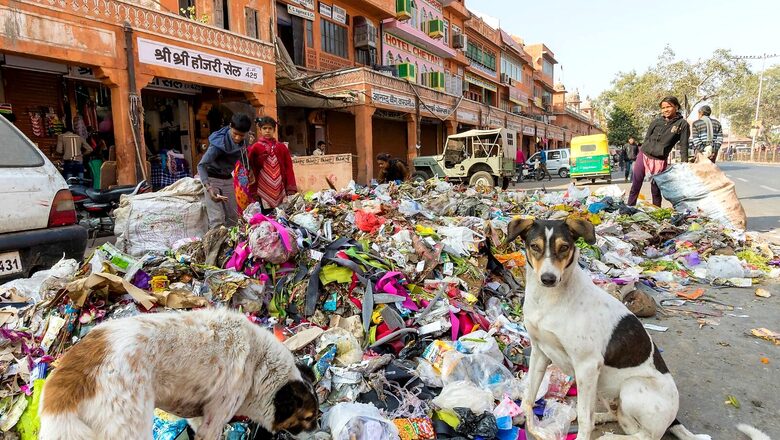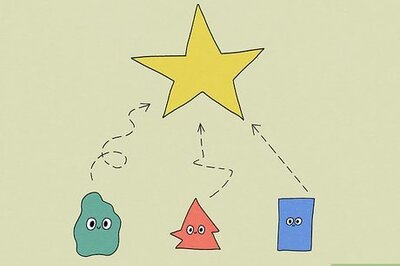'We Want to Go Green, But...': Ban on Single-use Plastic with No Cheap Option Leaves Vendors Anxious

views
The Centre’s ban on certain single-use plastic items came into force on Friday, the violation of which will invite punitive action, including a fine or a jail term or both. Among the most affected with this are hawkers and street vendors, who often take to use of single-use plastic for its affordability. However, with the ban taking effect, they have started switching to green alternatives while organisations representing them are holding awareness campaigns at regular intervals.
What is Single-use Plastic
Single-use plastics, or disposable plastics, are manufactured to be used only once before they are thrown away or recycled. The identified SUP items include earbuds, plastic sticks for balloons, flags, candy sticks, ice-cream sticks, polystyrene (thermocol) plates, cups, glasses, forks, spoons, knives, straws, trays, wrapping or packaging films around sweets boxes, invitation cards, cigarette packets, plastic or PVC banners less than 100 microns, and stirrers.
Street vendors and hawkers, especially those involved in the food business, are among the group who are largely dependent on single-use plastic. They use cheap disposable plates, cups, glasses, forks, spoons and straws to serve food.
Need for Cost-effective Alternative
Shaktiman Ghosh, General Secretary of NHF, said the body is mulling creating 10 model no-plastic cities across the country where hawkers and street vendors will completely give up using plastics. “We are planning to initiate a drive where 10 cities will be chosen and their vendors will be asked to not use plastic at all. Based on the success of this initiative, we will try to implement it everywhere,” Ghosh said. However, he said, as long as there is no cost-effective alternative, vendors will not be able to switch completely.
“We are trying to educate them, but the issue is that the available alternative is becoming too heavy on the pockets of the vendors. Moreover, the single-use plastics should be banned from the sources, so that it is not available for use. We all want to go green and stop using plastic items, but there is a dearth of alternatives,” Ghosh added.
Several vendors in Delhi are trying to adopt green alternatives and said they have switched to paper cups and tin foil serving bowls. “We have already switched to green alternatives. We have stopped using polythene, plastic cups, plates, spoons and forks. We have tried several alternatives in the past 15 days. We are facing a few issues like paper straws are not that effective. We have completely switched to a green alternative like tin foil. But it is quite expensive,” said Ghanshyam, owner of a kiosk serving Chinese dishes.
Another vendor in East of Kailash, who sells ‘Rajma-Chawal’ said: “I used to serve food in plastic plates and for takeaways, I would use polythene. But now I have switched to tin foil bowls and have asked my regular customers to bring empty utensils from home for takeaways. They (tin foil bowls) are a little heavy on my pockets.” There are over five lakh vendors in the national capital, as per NHF’s Delhi convener Sandeep Verma. In the national capital, the NHF is running several campaigns and “experiments” to prevent vendors from using SUP items, he said.
“At regular intervals, we are holding awareness campaigns and running experiments like asking vendors to ask people to bring their plates and charge one rupee extra for paper plates. But the effectiveness of these experiments is still to be known,” said Verma.
The representatives of the National Hawker Federation (NHF) said they are holding meetings with street vendors and ensuring that they have stopped using items made of single-use plastic (SUP). However, they are concerned the vendors are unable to find many cost-effective alternatives and that is preventing them to go green.
In a notification by the Union environment ministry issued in February, all states and Union territories (UTs) were directed to phase out SUP items in a planned manner by July 1, 2022.
Health Hazards of Single-use Plastic
Single-use plastic poses threat to human food chain and causes harm to human health by various ways. In today’s world, people eat, drink and breathe microplastics every day. When these small plastic particles enter our bodies, may harm our health.
Plastic products contain chemical additives. A number of these chemicals have been associated with serious health problems such as hormone-related cancers, infertility and neurodevelopment disorders like ADHD and autism.
When plastics and microplastics end up in the environment, they attract micro-organisms, such as harmful bacteria (pathogens). If microplastics containing these pathogens enter our body, they may increase the risk of infection.
The Central Pollution Control Board has also launched a grievance redressal application to empower citizens to help curb the use of plastic. Officials said plastic used for packaging in the FMCG sector is not banned but will be covered under the Extended Producer Responsibility (EPR) guidelines.
The EPR is a producer’s responsibility to ensure environmentally-sound management of the product until the end of its life. According to the CPCB, India generates around 2.4 lakh tonnes of SUP per annum. The per capita SUP production is 0.18 kg per year.
On August 12 last year, the ministry had issued a notification prohibiting manufacture, import, stocking, distribution, sale and use of identified SUP commodities, including polystyrene and expanded polystyrene from July 1, 2022. The identified SUP items include earbuds, plastic sticks for balloons, flags, candy sticks, ice-cream sticks, polystyrene (thermocol), plates, cups, glasses, forks, spoons, knives, straws, trays, wrapping or packaging films around sweets boxes, invitation cards, cigarette packets, plastic or PVC banners of less than 100 microns, and stirrers.
(With PTI inputs)
Read all the Latest News , Breaking News , watch Top Videos and Live TV here.



















Comments
0 comment